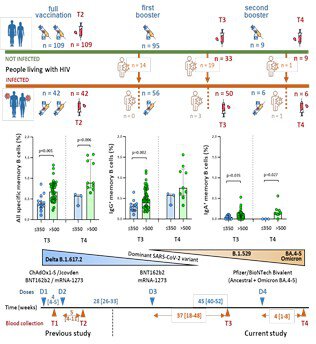Casado JL, Vizcarra P, Martín A, Moreno A, Pérez MJ, Fernández C, Martín S, Vallejo A. Humoral and cellular immune responses in people living with HIV following successive COVID-19 vaccine booster doses
Clin Microbiol Infect. 2025
"Why Extra COVID-19 Vaccine Boosters Matter for People Living with HIV" Dr. Alejandro Vallejo
Summary:
Objective: The aim of this study was to evaluate humoral and cellular immune responses in people living with HIV (PLWH) following successive COVID-19 vaccine booster doses, in order to determine immune correlates associated with clinical outcomes (avoiding severe infections) and epidemiological impacts (preventing new infections), a topic of growing controversy in this vulnerable population.
Methods: A prospective study followed 151 PLWH on suppressive antiretroviral therapy who completed initial COVID-19 vaccination and received two additional vaccine doses. The study evaluated changes in SARS-CoV-2-specific antibodies, SARS-CoV-2-ACE2 binding inhibition rates, Spike-specific memory B cells, and CD4/CD8 cell responses to variants (Ancestral, Delta, and Omicron), considering initial vaccine type, prior infections, and levels of immunosuppression.
Results: Vaccine doses progressively enhanced antibody levels, memory B cells, and T-cell responses. PLWH with CD4 counts ≤350 cells/mm3 showed impaired memory B cell production versus those with CD4 >500 cells/mm3 after the third dose (0.39% [0.29-0.55] vs 0.68% [0.49-0.86]; p<0.001). Immune responses remained consistent across variants. Non-infected PLWH receiving plasmid vector vaccines demonstrated lower antibody levels against Delta and Omicron (10930 ng/mL [9623-12511] vs 13340 ng/mL [10602-14724], p=0.018; 399 ng/mL [335-702] vs 615 ng/mL [492-924], p=0.041) compared to infected PLWH. IgA-producing memory B cells increased after the third booster, particularly with mRNA vaccines (0.05% [0.0-0.09] vs 0.11 [0.07-0.17], p<0.001 in non-infected individuals). Post-booster infection rates were higher in previously uninfected individuals (25% vs 4% after second booster, p<0.001), especially among vector vaccine recipients (34.6% vs 14.5%, p=0.028).
Conclusions: This study reveals that successive vaccine doses significantly enhance immune responses in PLWH, improving antibody levels, IgA+ memory B cells and T-cell responses, thereby reducing the risk of severe infections and potentially new infections. Nevertheless, low CD4 counts result in reduced memory B cells, necessitating tailored vaccination strategies. mRNA vaccines also offer superior protection against breakthrough infections during variant surges.
Why do you highlight this publication?
This study provides critical insights into how COVID-19 booster vaccines enhance immune protection in people living with HIV (PLWH). The study shows that repeated boosters significantly increase antibody levels and memory T and B cells, which are essential for long-term immunity. However, PLWH with lower CD4 counts still show weaker B cell responses, highlighting the need for tailored vaccination strategies to ensure durable protection. These findings are vital for optimizing vaccine approaches in immunocompromised individuals, helping them build stronger defenses against severe infections.
Publication commented by:
Dr. Alejandro Vallejo Tiller
INFECTIOUS DISEASES GROUP. IRYCIS



